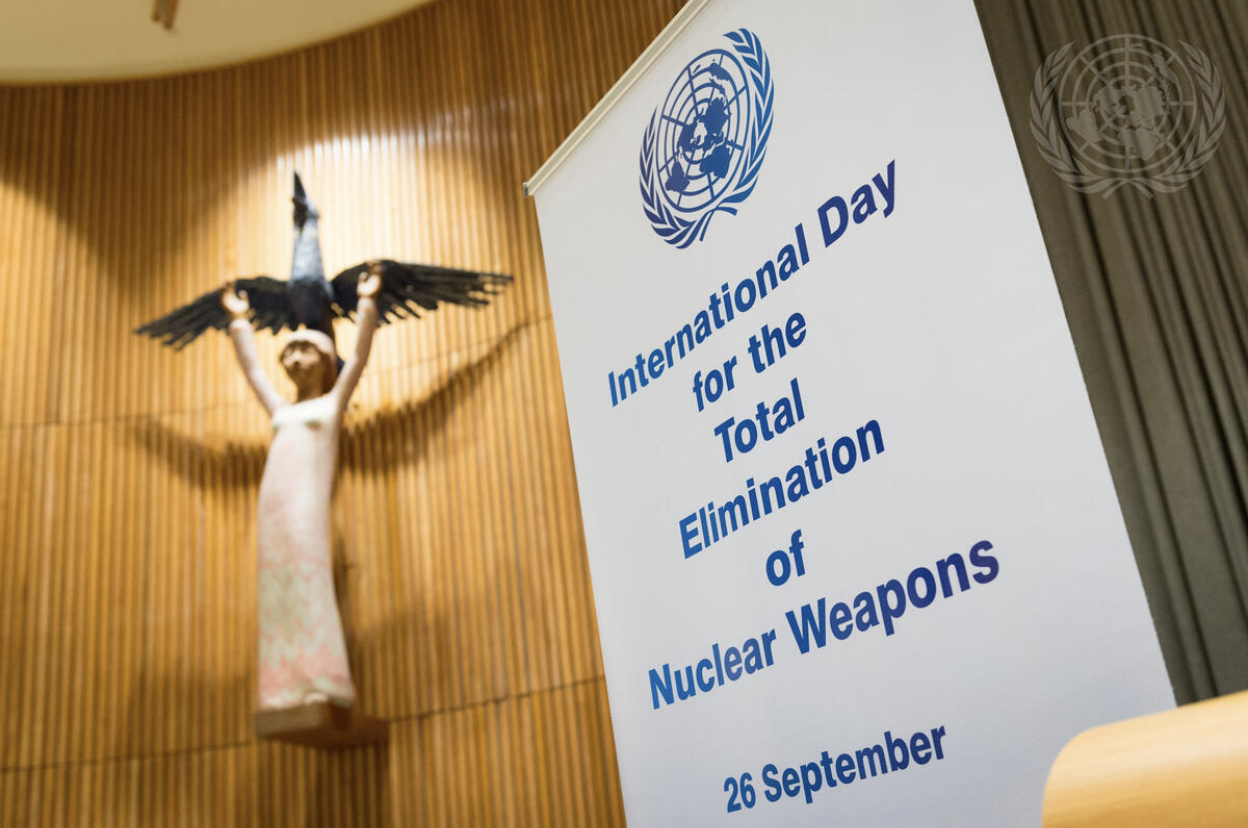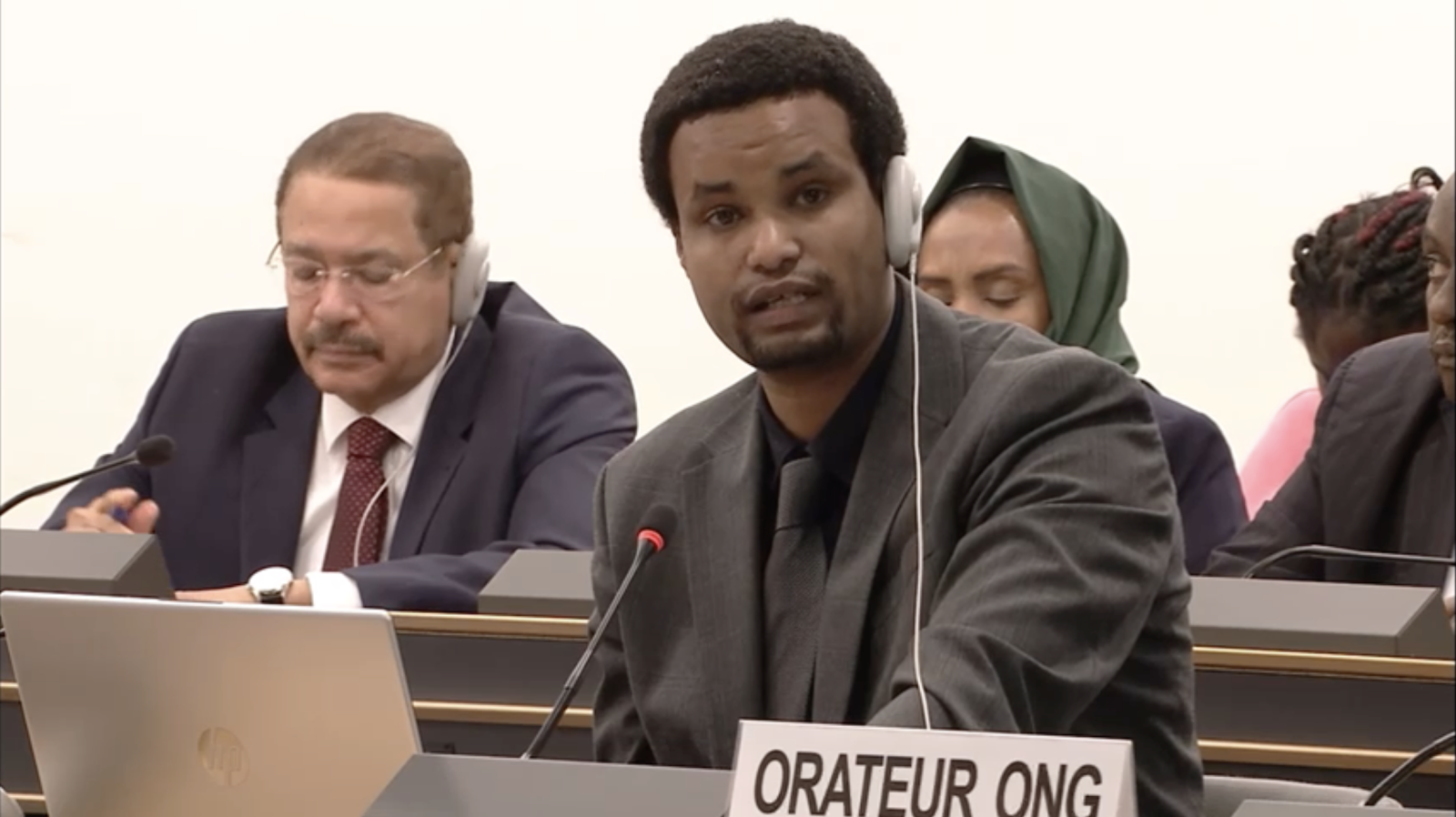International Day for the Total Elimination of Nuclear Weapons – 26 September

By Sonia Darrieumerlou / GICJ
Introduction
Humanity remains one miscalculation away from devastation. The International Day for the Total Elimination of Nuclear Weapons, observed annually on 26 September, serves as a crucial reminder of the dangers nuclear weapons pose to global peace, security, and human survival. Established by the United Nations General Assembly through Resolution 68/32 in 2013, this international day aims to promote awareness and support efforts toward the complete elimination of nuclear weapons worldwide.
The commemoration of this day is rooted in the urgent call for disarmament, especially as nuclear threats resurface amid rising global tensions. It encourages governments, civil society, and the international community to reaffirm their commitment to achieving a world free of nuclear arms.
Historical Context
The era of nuclear weapons began during the Second World War with the development of the Manhattan Project. On 16 July 1945, the first nuclear weapon was tested in New Mexico during the Trinity Test. Just weeks later, nuclear bombs were dropped on Hiroshima and Nagasaki, resulting in catastrophic loss of life and long-term health effects. The attacks killed an estimated 90,000 to 166,000 people in Hiroshima and 150,000 to 246,000 in Nagasaki. Survivors of the bombings, known as Hibakusha, continue to live with the physical and psychological consequences of these attacks.
These events demonstrated the unmatched destructive power of nuclear weapons and underscored the need for international frameworks to prevent their use and proliferation.
The Treaty on the Non-Proliferation of Nuclear Weapons (NPT)
The Treaty on the Non-Proliferation of Nuclear Weapons (NPT), which entered into force in 1970, remains the cornerstone of the global disarmament and non-proliferation regime. The Treaty recognizes five nuclear-weapon states, China, France, the Russian Federation, the United Kingdom, and the United States, on the basis that they had tested nuclear weapons before 1 January 1967.
Today, 191 States are parties to the NPT, making it one of the most widely adhered-to arms control agreements in history. The Treaty is built upon three pillars: non-proliferation, disarmament, and the peaceful use of nuclear energy. It establishes a legal obligation for nuclear-weapon States to pursue negotiations in good faith toward nuclear disarmament.
However, several States, including India, Pakistan, and Israel, have never joined the NPT and developed nuclear weapons independently. The Democratic People’s Republic of Korea initially acceded to the Treaty but later withdrew and pursued its own weapons programme. These developments highlight ongoing challenges to the Treaty’s universality and enforcement.
Selective adherence to international obligations, such as the refusal of some States to ratify key treaties, further undermines the integrity of the global legal order. This inconsistency complicates efforts to strengthen international law and increases the risk of conflict.
Geopolitical Implications of Nuclear Weapons
The possession of nuclear weapons continues to shape power dynamics among States, exacerbating geopolitical tensions and security dilemmas. Nuclear-armed States are often perceived as more powerful and resistant to external pressure, thereby widening the gap between them and non-nuclear-armed States.
This imbalance can destabilize international relations and encourage arms races. History offers multiple examples of how nuclear capabilities influence foreign policy decisions. One such case was the 1981 airstrike by Israel on Iraq’s nuclear facilities, which prompted the United Nations Special Commission and the International Atomic Energy Agency (IAEA) to conduct inspections that dismantled Iraq’s nuclear programme. However, in 2003, allegations resurfaced claiming Iraq was reinitiating its weapons programme, which contributed to the military invasion by the United States and the United Kingdom.
Under international law, the use of force is governed by the Charter of the United Nations. Article 2(4) prohibits the threat or use of force against the territorial integrity or political independence of any State, while Article 51 recognizes the inherent right of self-defence in the event of an armed attack. The 2003 invasion lacked justification under these provisions, as Iraq had not attacked either of the invading States.. On 7 March 2003, IAEA Director General Mohamed ElBaradei confirmed to the United Nations Security Council that no evidence had been found of a revived nuclear weapons programme in Iraq following months of inspections.
Recent Nuclear-Related Conflicts
Recent developments have further underscored the persistent and escalating relevance of nuclear-related tensions in the international arena. In June, the State of Israel launched a series of coordinated military strikes targeting nuclear facilities within the Islamic Republic of Iran. According to various reports, these strikes resulted in the destruction of a substantial portion of Iran’s missile and nuclear infrastructure. Iran’s Ministry of Health and Medical Education confirmed over 600 fatalities and thousands more injured, marking a severe humanitarian impact.
These hostilities have significantly intensified instability in the Middle East, raising alarm within the international community over the growing risk of a broader conflict. Humanitarian concerns have also come to the forefront, as critical infrastructure and densely populated areas are increasingly caught in the crossfire.
In the aftermath of the Israeli operation, the United States conducted its own targeted airstrikes on additional Iranian nuclear sites. While the U.S. government stated that no civilian casualties resulted from these actions, the strikes have nevertheless drawn scrutiny
Environmental Consequences of Nuclear Weapons
Nuclear weapons have a profound and lasting impact on the environment. The detonation of such weapons causes extreme heat, widespread fires, and releases radioactive fallout that contaminates air, water, and soil. These effects persist for generations, harming ecosystems and human health.
Beyond immediate destruction, large-scale nuclear conflict could lead to a significant drop in global temperatures, commonly referred to as a “nuclear winter.” This would reduce agricultural productivity, threaten food security, and endanger global development efforts. Addressing these environmental consequences is vital for achieving the Sustainable Development Goals and safeguarding the planet for future generations.
Global Disarmament Efforts and the Role of the United Nations
The international community has taken several steps to advance nuclear disarmament. In 2017, the United Nations adopted the Treaty on the Prohibition of Nuclear Weapons (TPNW), the first legally binding international agreement to comprehensively prohibit nuclear weapons, with the ultimate goal of their total elimination. The Treaty prohibits the development, testing, production, acquisition, possession, stockpiling, use, or threat of use of nuclear weapons.
The International Campaign to Abolish Nuclear Weapons (ICAN), which received the Nobel Peace Prize in 2017, has played a leading role in mobilizing global support for the Treaty. While no nuclear-armed State has yet joined the TPNW, its adoption marks a growing international consensus around the unacceptability of nuclear weapons.
Enforcement, however, remains a significant challenge. Without mechanisms to compel nuclear-armed States to disarm, the risk of proliferation and misuse persists. Addressing these issues may require the implementation of multilateral sanctions and stronger diplomatic engagement. At the June 2025 session of the IAEA Board of Governors, the State of Qatar formally urged Israel to place all of its nuclear facilities under IAEA safeguards and to accede to the NPT as a non-nuclear-weapon State, demonstrating the continued importance of international oversight and accountability.
GICJ’s Position
Geneva International Centre for Justice (GICJ) stands for the International Day for the Total Elimination of Nuclear Weapons as a vital reminder of the devastating humanitarian, environmental, and geopolitical consequences of nuclear arms.
Furthermore, we support the ideology and efforts towards a world free of nuclear weapons, built on the principles of international law, human rights, and multilateral cooperation. The continued existence and expansion of nuclear arsenals are incompatible with the right to life, right to safety and environmental protection.
GICJ calls upon all States to commit to the complete elimination of nuclear weapons. This includes full participation in and compliance with the NPT and the TPNW, acceptance of IAEA safeguards, and an end to military actions based on unverified nuclear threats. We urge the international community to uphold the rule of law and to reject the normalization of nuclear deterrence as a legitimate security strategy.
We believe that nuclear disarmament is not only a legal and moral obligation but also a practical necessity for ensuring peace, justice, and the protection of future generations.







